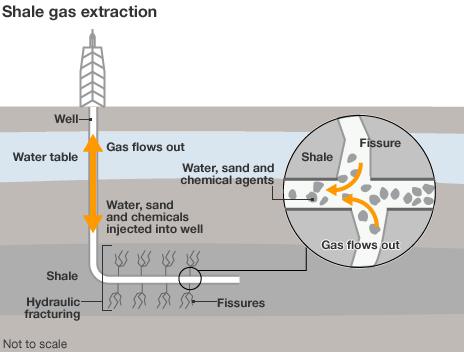Shale gas moratorium in UK urged by Tyndall Centre
- Published
Roger Harrabin shows how to get fuel from hard rock
The UK government should put a moratorium on shale gas operations until the environmental implications are fully understood, a report says.
The Tyndall Centre for Climate Change Research report comes amid reports a firm has found reserves in Lancashire.
In the US, officials are investigating claims that shale gas drilling has polluted water supplies.
However, UK ministers have rejected a moratorium, saying that drilling for shale gas does not pose a threat.
"We are aware that there have been reports from US of issues linked to some shale gas projects," a spokesman for the Department of Energy and Climate Change (Decc) told BBC News.
"However, we understand that these are only in a few cases and that Cuadrilla (the firm testing for shale gas in Lancashire) has made it clear that there is no likelihood of environmental damage and that it is applying technical expertise and exercising the utmost care as it takes drilling and testing forward."
'Play it safe'
The Tyndall report was commissioned by The Co-operative, an institutional investor in oil firms.
It is pressing firms not to invest in shale gas until further studies have been carried out into the effects of pumping chemicals underground to help release the gas trapped in shale rocks.
The Co-operative is concerned that Decc pronounced shale gas safe last week before the end of a consultation into the technology by MPs on the Commons energy and climate change select committee.
Paul Monaghan, head of the organisation's social goals, said: "There should be no fracturing of rock for shale gas until legislation can catch up.
"We are aghast that government accepted the assurances of industry on this while their own consultation had not even finished. There was a shale gas rush in the US and now they are looking into the implications - we need to do it the other way round."
The Tyndall report also expresses concern that the exploitation of shale gas is bringing new greenhouse gas sources into play.
It says: "This will further reduce any slim possibility of maintaining global temperature changes at or below 2C (3.6F) and thereby increase the risk of entering a period of 'dangerous climate change'."
Gas security
Shale gas has become an energy phenomenon since firms in the US found economic ways of extracting gas previously trapped in shale rocks, which have metamorphosed from clay deposits under pressure and heat.
The process involves drilling horizontally into shale formations far underground, then using small explosions to fracture the shale - followed by a slurry of water, sand and chemicals to free the trapped gas.

The US was gearing up to import gas, but experts suggest that the shale reserves may provide the nation with gas supplies for 100 years.
Large deposits of shale gas are expected to be unearthed in China, Europe and South America too.
Experts say the technological breakthrough increases energy security worldwide and reduces the diplomatic power of gas-rich nations, such as Russia.
But there have been reports of problems with the technology in the US, such as cattle dying after drinking water from the fracturing process that found its way to the surface.
In Pennsylvania, some residents can now set fire to their drinking water after methane leaked into wells. They are blaming shale gas extraction.
The Tyndall report says that gas drilling in Lancashire will give rise to a range of local concerns including noise pollution, high levels of truck movements and land use demands.
The Decc spokesman said: "We support industry's endeavours in pursuing energy sources (like shale gas), provided that tapping of such resources proves to be economically, commercially and environmentally viable.
"All onshore oil and gas projects, including shale gas exploration and development, are subject to a series of checks, including local planning permission before they are able to move ahead with drilling activities."
Mark Miller from Cuadrilla Resources said: "We disagree with the conclusions of the Tyndall Centre report which calls for a moratorium on shale gas activities as there are no grounds for a moratorium on this proven and long-standing technology.
He added that Cuadrilla had received full local and national approvals from all appropriate bodies in order to explore for natural gas at each of its sites.
Stephen Tetlow, chief executive of the Institution of Mechanical Engineers, said: "While 90% of UK heating needs are met by gas energy, the UK is expected to have to import 80% of its gas supplies by 2020.
"This is unsustainable, bad for our energy security, and very expensive."
- Published21 December 2010
- Published21 December 2010
- Published6 January 2011